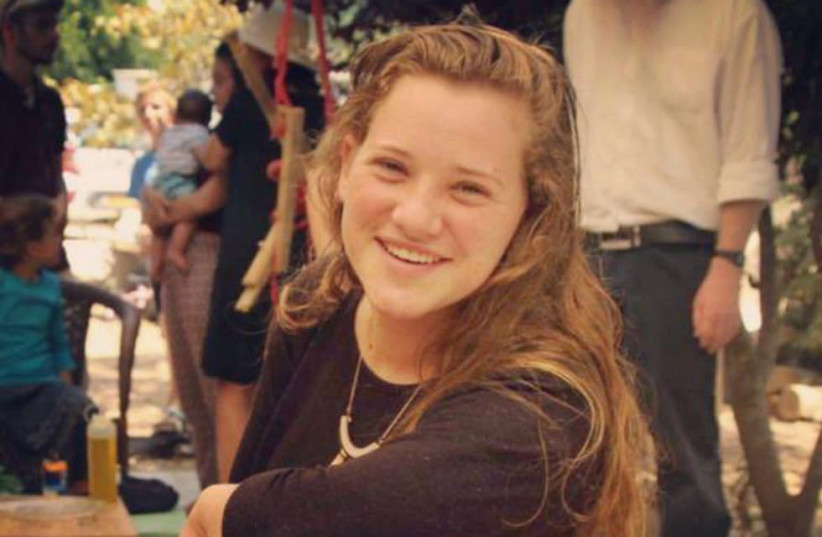Think about the following number: 1,396 – that is how many Israeli civilians have died in terror attacks since 2000 alone. That is nearly 1,400 sons or daughters, brothers and sisters, cousins, neighbors taken away from their loved ones abruptly and brutally.
Every day we remember one of them.
On August 23, 2019, 17-year-old Rina Shnerb was murdered.
Rina is not the only victim who was killed with an explosive device, nor is she the only teenaged casualty of terror. However, Rina’s death was unique in its international implications, which are still resonating today – because the alleged terrorists responsible for her death were, at the time, employed by European-funded non-governmental organizations (NGOs). Yet, European governments have repeatedly condemned Israel for taking decisive action against the Palestinian NGOs that are closely linked to terror groups.
Following Rina’s murder, Israel arrested 50 people from the Popular Front for the Liberation of Palestine (PFLP) terror network operating in the West Bank. At least five served in senior positions, including financial director and general director, in Palestinian NGOs that claim human rights and humanitarian mandates.

Fast forward to October 22, 2021, and the Israel Defense Ministry’s designation of six PFLP-affiliated NGOs as terror fronts, accusing them of promoting the terror group’s agenda, recruiting activists for it, and diverting funds from European government donors.
Understanding this context is crucial: The EU and other European governments have regarded these NGOs, as well as seven others in the PFLP-NGO network, as their main Palestinian civil society partners for decades. They provided them with more than $200 million over the last decade alone, ostensibly to promote human rights and humanitarian projects. This emphasis is justified as central to the post-Cold War Western European ethos, in which “vibrant civil society” is believed to be central in building democracy and sustainable development.
In Europe, NGOs are regarded as far more trustworthy than other actors, which is used to justify the generous funds and access given to them. Working with PFLP-linked NGOs was culturally easier, in contrast to other Palestinian frameworks, given the PFLP’s secular Marxist agenda that allowed easier communication and interaction.
This relationship created a co-dependence: the more European donor governments invested in these NGOs over the years, the more they needed to justify the importance of this partnership. And the more funds the Palestinian NGOs received, the more projects they needed to keep the process going.
The actual activities of the NGOs in question were of little importance, which mainly revolved around blaming everything and anything on the “Israeli occupation.” This co-dependence explains both why the Europeans ignored blatant incitement against Jews and Israelis coming from these NGOs, as well as their criticism of the Israeli designation of NGOs as terror groups.
It also explains why European governments simply ignored the evidence of the NGOs’ terror links. Using open sources – easily accessible to any government wishing to serious vet its grantees – NGO Monitor identified 70 employees and/or board members at the 13 NGOs who simultaneously held PFLP and NGO positions. At least 14 NGO officials were arrested for terror-related offenses.
Murder turned political
UNFORTUNATELY, this dynamic turned Rina’s murder into a political football. Unlike most security-related episodes, European governments publicly questioned Israel’s intelligence evidence.
This politicization of Rina’s murder affected the relationship between Israel and the Europeans. In 2020, Israel summoned three European ambassadors for demarche over their NGO funding policies. In Europe, as well, there was a deep divide between how elected officials and administrations viewed the issue.
Pressured by members of parliament, the EU and two other European countries launched official investigations into potential abuse of taxpayers’ monies by NGOs. The Dutch canceled their contract with one of the designated NGOs after an independent investigation found ample evidence of PLFP affiliation. The EU froze funds to two PFLP-affiliated NGOs pending investigation; and the German foreign minister announced that Germany would continue supporting Palestinian civil society without engaging with the designated NGOs.
In contrast, as part of this political debacle and in a show of support to the Palestinian terror-affiliated NGOs whose main source of funding was in jeopardy, nine European countries (Belgium, Denmark, France, Germany, Ireland, Italy, the Netherlands, Spain and Sweden) issued a joint statement last month, rebuking the Israeli designation and claiming Israel provided “no substantial evidence.”
But Israel did not back down. Last week Defense Minister Benny Gantz ratified three of the designations, and security forces raided the NGOs’ offices and confiscated materials.
As we think about Rina and her family today, the question remains how long the political battle will overshadow the significant security concerns. Will European governments continue to deny the simple facts available to anyone who can Google? Will the ambassadors of the donor European states have the guts to tell Rina’s parents that they are prepared to continue funding the PFLP-NGO terror network?
Rina’s murder should have been a call to action for a fundamental change in how European governments chose their NGO partners, in the PA and beyond. One would hope that any terror affiliation or glorifications should be sufficient reason to disqualify, immediately, an organization from receiving public funds – let alone with links to a terror group that murdered an innocent girl.
May Rina’s memory be a blessing.
The writer is NGO Monitor’s vice president.
